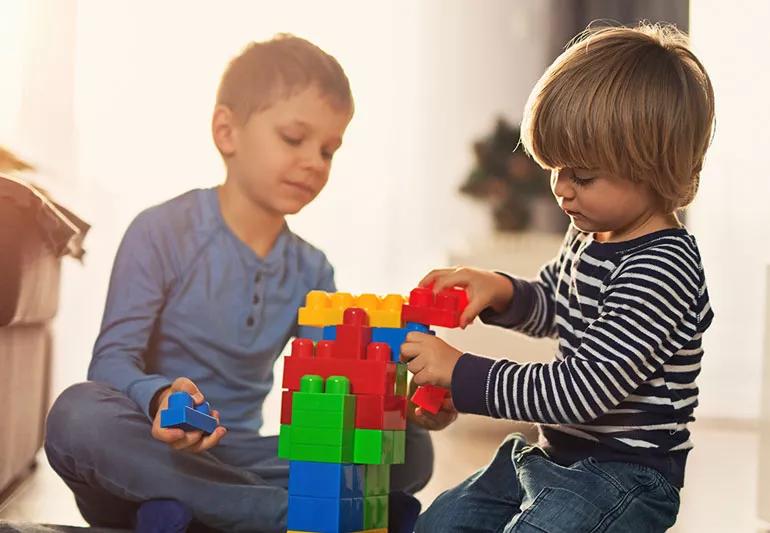And 4 other ways to prepare your child for a STEM career

Image content: This image is available to view online.
View image online (https://assets.clevelandclinic.org/transform/e4519682-48bc-4a23-aade-2031adb98cce/stemToys-638509674-770x553_jpg)
Two young boys playing with building blocks
From prenatal vitamins to preschool waiting lists — even before your little nugget is born, you do things to give them a leg up in life. And toy manufacturers know it.
Advertisement
Cleveland Clinic is a non-profit academic medical center. Advertising on our site helps support our mission. We do not endorse non-Cleveland Clinic products or services. Policy
Enter STEM toys, which run the gamut from Legos to make-your-own robot kits. But are these toys the key to unlocking your child’s potential?
STEM toys are designed to stimulate your child’s interest and skill in science, technology, engineering or math. And it’s obvious why parents are buying in. According to a Commerce Department study, STEM jobs are growing faster than non-STEM jobs. In 2015, people who worked in STEM fields earned 29% more than those who worked in other fields.
But according to pediatric behavioral health specialist Amy Lee, PhD, you may want to think twice before opening your wallet too wide. Your home (and the great outdoors) already contain everything you need to build up your child’s STEM love and skills. Who knew?
As tablets and other tech continue to be marketed to and for children, warnings from the pediatric health community are getting louder. “Early access and exposure to screens and screen time is detrimental for child development,” states Dr. Lee.
She says there’s even some research showing an increase in children being referred for occupational therapy for sensory integration problems. Symptoms of sensory problems include oversensitivity to the environment, being uncoordinated and having difficulty engaging in play. There’s some evidence that these problems are related to having less free and outdoor play.
Advertisement
Free play is exactly what it sounds like: play in which children can do what they want. It should be fun, unstructured and technology-free. And it’s critical to a child’s development.
Benefits of free and outdoor play:
And as it happens, explains Dr. Lee, these are the exact skills people need to excel in STEM fields.
Think about the skills involved in science. You need to ask open-ended questions, manipulate the environment and problem-solve. Problem-solving is also critical in math, along with sustained effort and attention, repetition and practice.
To cultivate these talents, you need exposure to people and the natural world — not the latest gadgets. Give your children ample opportunity to interact freely with their environment. That will help them develop the STEM skills needed to harness the power of techie tools.
“The idea of STEM toys capitalizes on parental anxiety about their kid falling behind. But no child, unless they’re living in a bubble, is going to be technologically illiterate in this era,” assures Dr. Lee.
We can teach things that look flashy, exciting and advanced, but we’re missing essential skills if we go there too soon. STEM toys should be add-ons to enhance play, not the main event.
The bottom line: Send your kids outside to play, and stay strong in the face of “I’m bored!” complaints. Not only will they have a chance to hone their STEM skills naturally, but they may even thank you later.
How else can you help build your child’s brain?
Advertisement
If you want to go STEM, Dr. Lee recommends lower-tech versions, such as Legos and K’Nex. “Choose things that involve building or creating. Look for toys that are interactive, involve open-ended solutions and encourage collaboration. Those are the building blocks of STEM.”
Advertisement

Sign up for our Health Essentials emails for expert guidance on nutrition, fitness, sleep, skin care and more.
Learn more about our editorial process.
Advertisement
Around age 4, start talking to your child about what an emergency is and how to call emergency services
Most kids are eligible to start kindergarten when they’re 5 — but age isn’t the only factor to consider
This child development strategy is all about meeting your child where they are
Tiny taste-testing is a way babies can explore their world, relieve aching gums and self-soothe
Start with a few minutes a day and work your way up to an hour or more to help your baby hit developmental milestones
This important activity helps babies reach developmental milestones like rolling, sitting up and crawling
Being the oldest, youngest or middle child may affect characteristics and traits, but the theory isn’t an official medical or psychological diagnosis
Being the oldest female sibling in your family can have an impact on your personality and behavior
Prioritize your health by managing stress, strengthening your social connections and getting quality sleep
Bolsters, blankets, pillows and blocks can offer extra support, stability and comfort
Allergies, postnasal drip, asthma or reflux could be to blame for a cough that won’t quit